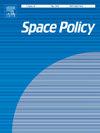SPACECAST 2020 twenty-nine years on: The legacy of a 1994 Air Force white paper seen through contemporary American planetary defense
IF 2
4区 社会学
Q2 INTERNATIONAL RELATIONS
引用次数: 0
Abstract
In June of 1994, the term “planetary defense” was first published in a white paper included in a U.S. Air Force report called SPACECAST 2020. The white paper warned of the threat of potentially hazardous asteroids to Earth and suggested methods of asteroid impact mitigation through an organized Air Force program. Today, the United States strongly contributes to the world-wide effort to find, track, characterize, and mitigate potentially hazardous objects (PHOs) via the NASA Planetary Defense Coordination Office (PDCO). This paper analyzes the evolution of U.S. planetary defense since SPACECAST 2020 and evaluates the influence of the white paper's recommendations nearly thirty years on.
SPACECAST 2020》问世 29 年了:从当代美国行星防御看 1994 年空军白皮书的遗产
1994 年 6 月,"行星防御 "一词首次出现在美国空军一份名为 "SPACECAST 2020 "的报告中的白皮书中。白皮书警告说,潜在的危险小行星对地球构成威胁,并建议通过有组织的空军计划来减少小行星撞击的方法。如今,美国通过美国国家航空航天局行星防御协调办公室(PDCO),大力协助全世界寻找、跟踪、描述和减缓潜在危险天体(PHOs)的工作。本文分析了自 2020 年 SPACECAST 会议以来美国行星防御的演变,并评估了白皮书中的建议在近三十年后的影响。
本文章由计算机程序翻译,如有差异,请以英文原文为准。
求助全文
约1分钟内获得全文
求助全文
来源期刊

Space Policy
Multiple-
CiteScore
3.40
自引率
36.40%
发文量
40
期刊介绍:
Space Policy is an international, interdisciplinary journal which draws on the fields of international relations, economics, history, aerospace studies, security studies, development studies, political science and ethics to provide discussion and analysis of space activities in their political, economic, industrial, legal, cultural and social contexts. Alongside full-length papers, which are subject to a double-blind peer review system, the journal publishes opinion pieces, case studies and short reports and, in so doing, it aims to provide a forum for the exchange of ideas and opinions and a means by which authors can alert policy makers and international organizations to their views. Space Policy is also a journal of record, reproducing, in whole or part, official documents such as treaties, space agency plans or government reports relevant to the space community. Views expressed in the journal are not necessarily those of the editors or members of the editorial board.
 求助内容:
求助内容: 应助结果提醒方式:
应助结果提醒方式:


